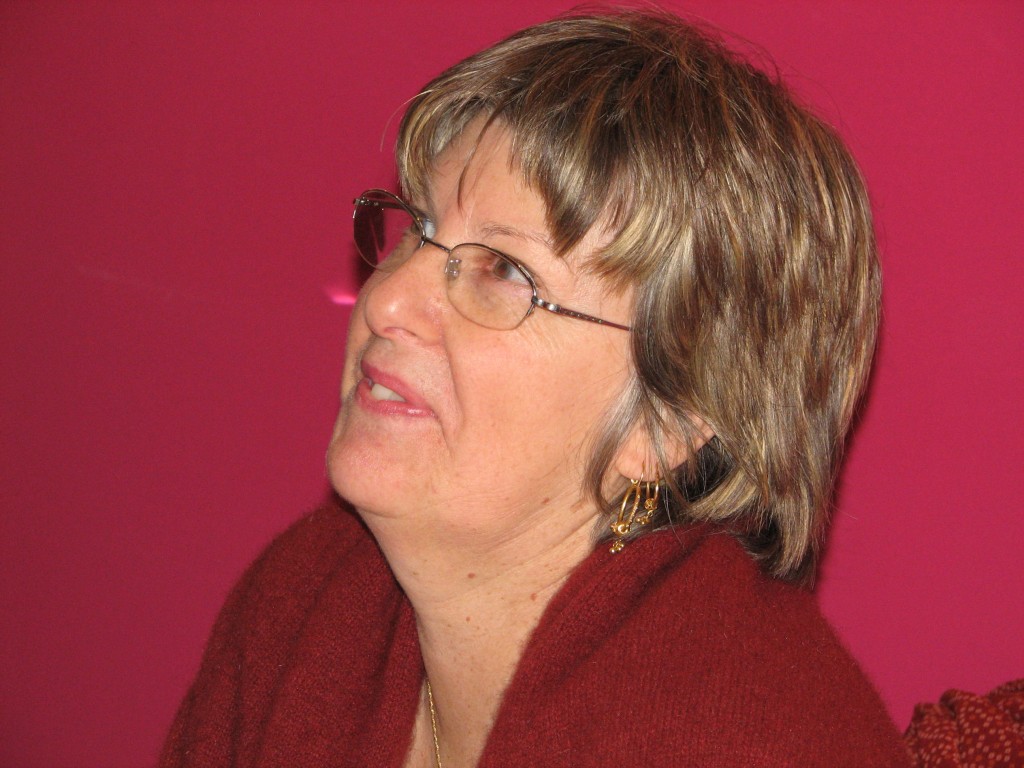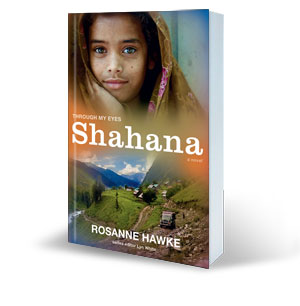Book review: The Truth About Peacock Blue

Hawke, Rosanne, 2015, The Truth About Peacock Blue, Allen & Unwin, Crows Nest.
Compelling
This latest novel for young people written by South Australian author Rosanne Hawke is compelling reading. It is one of those stories you can’t put down, but you know that to go on reading will be confronting, challenging, and even infuriating. I say ‘infuriating’ because many readers will want to jump into the story personally and put right some terrible injustices. The caption under the title on the cover encapsulates the story so well: A powerful story about one girl’s fight for justice in Pakistan.
Contemporary
This story deals with real issues in the real world in the lives of real people today. While it is fiction Hawke has been inspired by the true story of Pakistani woman Asia Bibi who has been accused of blasphemy. She has been in prison for five years and remains there as I write this. I read this novel shortly after finishing the autobiography of I Am Malala – you can read my review here. That was confronting enough, but on the very next morning after reading Hawke’s novel our guest speaker at our church was Bishop Patrick Sookhdeo, founder of the Barnabas Fund. He spoke graphically of the growing crisis in Syria and surrounding countries, as well as issues in Pakistan and elsewhere.
Challenging
The brother of the protagonist Aster dies due to an illness. She is then thrust into the limelight as the hope of the family. She is enrolled in the high school where her brother was to attend. She is at first excited and keenly looking forward to the opportunity of an education, something denied many girls in Pakistan.
Life quickly turns sour for Aster in her new school. Being a Christian in a predominantly Muslim community has many challenges for her. When one of her teachers takes a strong dislike to her, life becomes very challenging and potentially dangerous. In the midst of the anxiety of exams, Aster is suddenly arrested in front of her fellow students because of something she wrote in her paper. She is accused of blasphemy, a serious crime which leads to the death penalty in Pakistan.
Confronting
The remainder of the story documents the struggle Aster has to come to terms with life in prison. The conditions are confronting to readers like myself: atrocious, inhumane and downright filthy, not to mention dangerous. Her trial is rescheduled a number of times and her challenges mount daily. Throughout all of this she never loses her faith which shines through the darkness and evil all around. I had to personally face the question: ‘How would I react and cope if faced with similar persecution?’ In my sheltered life here in Australia I have never been confronted by such issues.
Campaign
Aster’s Australian cousin Maryam takes up the challenge of helping her. She starts an online campaign in the form of a blog and a worldwide petition on behalf of Aster. Hawke has cleverly used fictional quotes from the blog to debate some of the issues surrounding this terrible law of blasphemy. Similar real-life, heart-wrenching campaigns are becoming far too common place today.
Conclusion
Once again Rosanne Hawke has written an emotive, fast moving and insightful novel. The reader gets an in-depth view of life in a repressed country with all the cultural, social and religious nuances at play in the lives of her characters. By the end of the book the reader has a strong sense of the utter hopelessness of her fellow prisoners but also of Aster’s hope under-girded by her strong Christian faith.
Highly recommended.
Further reading:
- I am Malala
- Kerenza – my review of Rosanne Hawke’s novel (this article has several other links to reviews of her works)
- Shahana – my review of another of Hawke’s novels

Rosanne Hawke talking to fans at the launch of “Marrying Ameera”
Book review: Kerenza: a New Australian

South Australian author Rosanne Hawke recently published another fast moving and interesting novel for children. Karenza – a New Australian is the story of a young girl growing up in Cornwall who is suddenly taken by her family in the early 1900s to a strange new land on the other side of the globe – South Australia. The family boards a steamship for Port Adelaide, and after a short sojourn in suburban Adelaide the family sets off out into the bush.
The Mallee region of the eastern parts of South Australia is at that time sparsely populated by new settlers. The Aboriginal people, however, have lived in this area for millennia, but for the Europeans it is strange, foreboding and harsh. Kerenza and her family take some time to adapt to being farmers the new environment, and living is difficult, challenging and often dangerous. How they cope, adopt new ways of living and grow to love this new country is the backbone of this new novel by one of our Australia’s foremost authors.
On a personal note I strongly identified with this story. In fact, I grew up within about 20 kilometres of where this story is set. My own grandparents were early settlers in this area, so I know it well. In fact, I have long had the desire to tell a fictional version of my own family’s story. They migrated from Silesia in Germany (now part of Poland) in the 1840s due to religious persecution, and came to the Barossa Valley in South Australia. Later, in the early 1900s, about the same time as the setting of Rosanne’s book, they moved to the Loxton area. Together with his sons, my nephew still works the family farm.
Publication details:
Hawke, Rosanne, Kerenza: a New Australian, 2015, Omnibus Books, Parkside, South Australia.
Further reading:
- Rosanne Hawke – the author’s website
- Marrying Ameera by Rosanne Hawke – my review of this book
- Through My Eyes: Shahana by Rosanne Hawke – my review of this book
- Taj and the Great Camel Trek by Rosanne Hawke – my review of the book
- Launch of Marrying Ameera by Rosanne Hawke – photos of the launch of this book

Rosanne Hawke
Book launch

Rosanne Hawkes’ latest book for younger readers Kelsey and the Quest of the Porcelain Doll will be launched tomorrow by best selling author Katrina Germein.
4:30 pm Thursday July 3rd
Tabor Adelaide
181 Goodwood Road, Millswood, Adelaide
To RSVP: phone 08 8373 8777
Review: Through my eyes: Shahana

“Shahana” by Rosanne Hawke is the first in a series of novels set in war zones as told through the eyes of a young person. This story is set on the Pakistani-Indian border. The author spent some time in Pakistan as an aid worker, her experiences there bring a realistic authenticity to a well crafted and exciting story. In an historic postscript to the novel, Hawke explains that the conflict over sovereignty of Kashmir is the longest existing war anywhere, having commenced in 1947. As is common to most war zones, it is the children who suffer the most.
The protagonist Shahana is an orphan, living alone with her younger brother within a short walk of the Line of Control patrolled constantly by Pakistani and Indian soldiers. Being orphans, Shahana supports her fractured family by creating exquisite embroidery, her only means of financial survival.
When Shahana rescues unconscious Zahid near the border, she is thrown into a dangerous dilemma. She can’t leave him to die, but to shelter him in their humble home brings her and her brother an even great risk. To alert the authorities would bring Zahid certain imprisonment or even death. To further complicate Shahana’s life, her brother Tanveer is taken captive and into virtual slavery under the “care” of the man to whom she sells her embroidery, a man who would do anything to marry her despite the big difference in their ages.
This is a fast moving, exciting, page-turning novel with many twists in the plot. The author has drawn a range of believable characters caught in a dangerous, life-threatening situation. Life in Pakistan today is shown with all its terrible dangers and stark beauty. Highly recommended.
“Shahana” is published by Allen & Unwin.
Teachers’ notes and an interview with the author can be found here.
My next review in two days time will be of the second in this series, “Naveed” set in Afghanistan.
Disclosure: Rosanne Hawke was my supervising lecturer during the writing of my thesis novel for my Master of Arts Creative Writing degree and remains a close friend and former colleague.
Review: Taj and the great camel trek

Cover of "Taj and the great camel trek"
Book review:
Rosanne Hawke: Taj and the great camel trek.
Published in 2011 by University of Queensland Press.
Two weeks ago I was privileged to attend the Adelaide launch of Rosanne Hawke’s latest novel. I am becoming addicted to launches of her books; this is the fourth one I’ve attended in three years. As anticipated it was a joyous time of celebration because I know how hard she has struggled with this story over the last 4 years.
The main character, twelve year old Taj, lived in Beltana in outback South Australia in the 1870s. His father is a cameleer and Taj has his own camel Mustara, a character in its own right. In fact, Taj and Mustara have featured in another Hawke book, the picture book Mustara.

Cover of "Mustara"
Taj and Mustara are invited to join explorer Ernest Giles on his second expedition across Australia from Beltana to Port Augusta and then on to Perth in Western Australia. It is not a journey to be undertaken lightly because much of the territory they planned to cover is desert, for most part uninhabited even by local Aboriginal people. The team accompanying Giles struggle with coming to terms with the isolation, their own feelings of fear, the harsh environmental conditions and the almost total lack of water. At times, they traversed many hundreds of miles without finding a drop of water. The whole journey has them on the very edge of disaster throughout, giving the reader a sense of the extreme hardships they endured.
While this is a novel, written as fiction and from Taj’s point of view, many of the incidents and characters are based on real events and real people taken from Giles’ own journal and the records in newspapers of the day. Taj himself is a fictitious character which points to the real strength of this book. Rosanne revealed at the launch that this book was originally conceived as non-fiction, but early on in her research and early drafts discovered that fiction was a far more powerful vehicle to tell the story. In this way the author has brought history to life for the reader, a delicate balancing act at the best of times. She has handled the transition with great skill. We see and feel the anxiety of the party through the eyes and emotions of Taj.
Highly recommended reading.
Links:
- Rosanne Hawke’s web site
- Taj and the great camel trek special page – including photos from the launch and teachers’ notes.
- Merchandise – buy T-shirts, mugs, ties, fridge magnets and many other items featuring the cover art work from the book. I am the proud owner of a Taj coffee mug which I use every day.
- Marrying Ameera – my review of Rosanne’s previous best selling novel, listed recently as a Notable Book.
Disclosure: Rosanne was my supervising lecturer when I completed my Master of Arts (Creative Writing) course recently. Apart from being a great friend and an amazing mentor, I gain nothing from promoting her books and the merchandise associated with it. Reviewing her books is just my way of saying ‘thank you, Rosanne.’
Rosanne Hawke and a friend